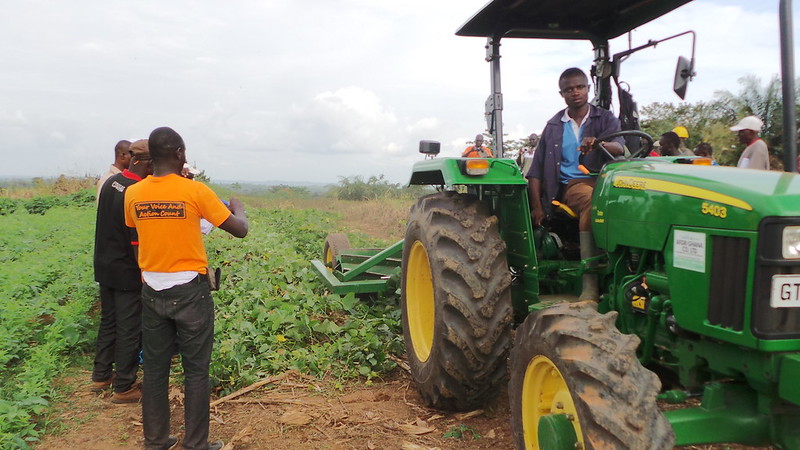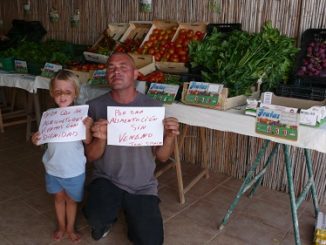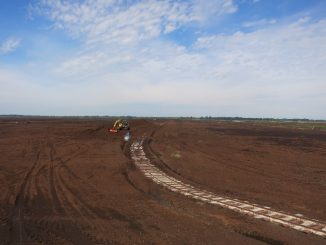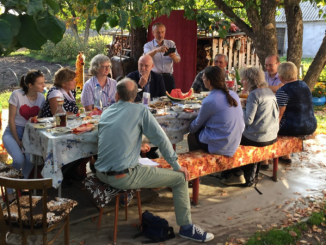
There is something of an incongruity between organic and no-till approaches to cereal and vegetable production. Both approaches emphasise building soil organic matter. However weed control is difficult in organic, without at least some minor soil disturbance. At a recent Agroecology Europe Forum in Greece, there were some promising signs of progress.
By Oliver Moore
There is something of an incongruity between organic and no-till approaches to cereal and vegetable production. Both approaches emphasise building soil organic matter. However weed control is difficult in organic, without at least some minor soil disturbance. At a recent Agroecology Europe Forum in Greece, there were some promising signs of progress.
A European Innovation Partnership (EIP) initiative from Sweden is focused on growing grains in northern Europe within a perennial grass system. Yes that’s right – grass and grain in the same field at the same time.
Researcher Vidar Brodin notes that much of the research in this area comes from warmer climes such as Australia. There, “farmers can reach yields about 70% of the typical yield for cereals, but of course there are other benefits, including a grass crop and the lack of soil disturbance. Growing grains this way can have substantial effect on environmental aspects such as soil quality, biodiversity and climate impact, and also on the economic and social situation for the farmer, with reduced need for external inputs, less costly machinery and less field operations” Brodin says.
He aims to see how adaptable these systems are in northern temperate climates. Indeed his research is exploring whether “it’s possible to grow grains in a perennial cover of herbs and grasses, without the need for tillage or chemical inputs” – no small task considering how northerly Sweden is.
Brodin is excited by the fact that “by growing the annual crops in a perennial ecosystem, it is possible to access the functionality of a much more complex and productive ecosystem than what is normally available in any field production”.
This being an EIP, there is an emphasis on farmer-to-farmer learning. “We will try to combine farmer knowledge from the already existing systems and research results from our region, with the prerequisites of local ecology and farming practices.”
Another focus area at the forum was on the practicality of the no-till roller-crimper for vegetable production.
This SoilVeg research, led by David Navaro-Miro in Barcelona assessed the crimper-roller for cover crops (which he calls “agroecological service crops”, or ASCs) . To improve energy efficiency and the “physical and biological quality of the soil” ASCs make sense, though there is scope for increasing their use. The no-till roller crimper flattens the ASC, creating a dense layer of plant residues (mulch) on the soil surface. This can help with weed control, reducing soil erosion, and being more efficient with labour and energy use.
Unlike the fledgling EIP Brodin is initiating, Navarro-Miro’s project is spread out over nine European countries. Different crops, soils and climatic conditions are thus studied in this SoilVeg project, which, as the name suggests, is also more focused on horticulture than cereals.
Overall, the SoilVeg project results showed “dramatically reduced weed abundance at early stages of crop growth in different vegetable systems, soils and climatic conditions”. The roller crimper also “increased the potential energy that can be recycled within the cropping system, and therefore enhancing its environmental performance.”
It wasn’t all good news however: “the results also noticed lower marketable yield and cash crop quality…compared to green manure.”
Navaro-Miro wants more research into screening ASC species that can both produce biomass and be flattened; improving planting and breeding techniques; better no till machinery design; new indicators and assessments also incorporating socio-environmental aspects.
This green manure finding, coupled with recent findings on compost for deep carbon storage (see below), suggests both no-till and organic systems need to keep learning from each other.
A version of this article also appeared in the Irish Examiner’s farming supplement.
More on Agroecology Europe Forum
Agroecology Europe Forum | What is this Thing called Agroecology?
Agroecology Europe Forum | Apo Kinou – Crete’s Full Farm to Fork Social Co-op
More on no-till
#SoilMatters | Part 1: Andrea Beste on humus, soil structures & the limits of no-till
#SoilMatters Part 3 | Soil, Carbon and Policy – where now for 4p1000?
More on Crops





